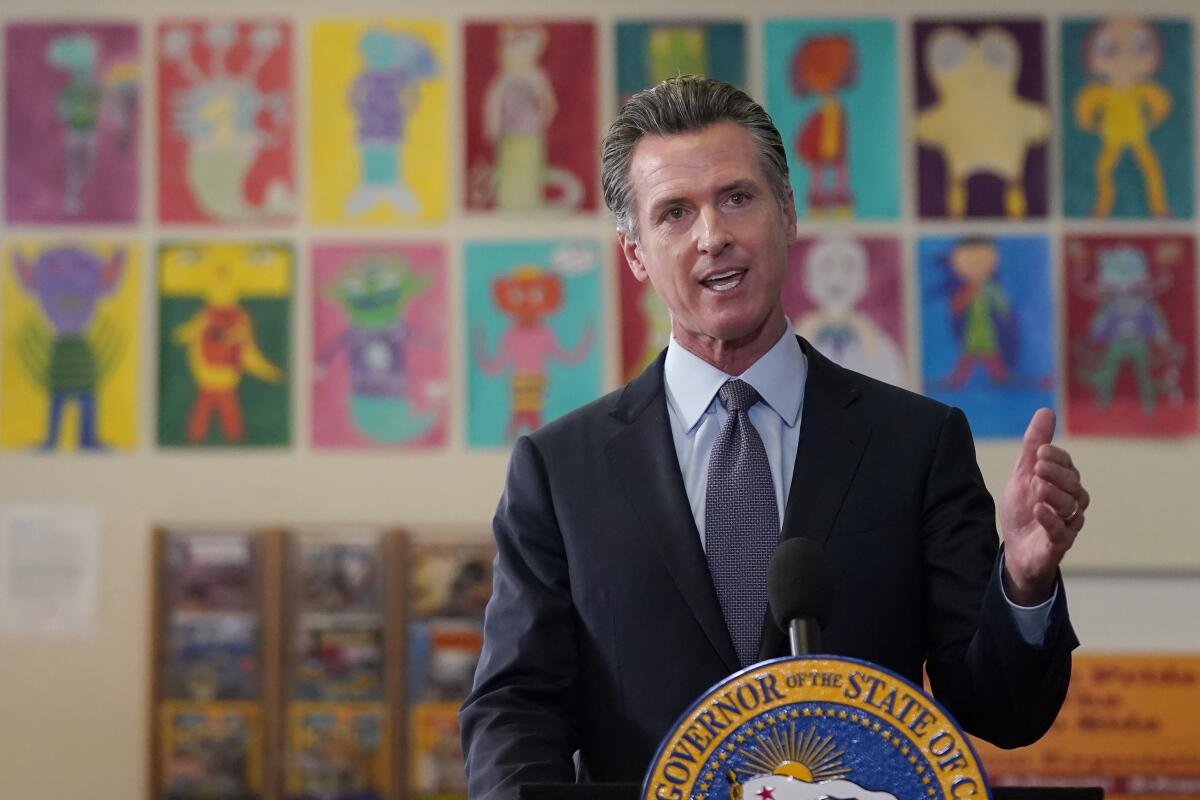California Politics: The governor’s all-powerful veto

The checks and balances between California’s legislative and executive branches of government are designed to allow the Legislature to write laws, the governor to block those laws if desired and legislators — if they feel strongly enough — to supersede the governor and put them into practice.
But the final component of that structure has laid dormant for more than 40 years, as more than a generation of legislators has refused to challenge bill vetoes by governors of both parties — even when the Legislature overwhelmingly supports a proposed law.
A veto override is supposed to be rare. But should it be nonexistent?
41 years and counting
By the time then-Gov. Jerry Brown was well into his second unsuccessful campaign for president, his relationship with the Legislature had soured. A sputtering economy was bad enough for lawmakers; a governor barnstorming battleground states instead of solving problems in Sacramento made matters worse.
The result was that Brown made history for the number of times the Legislature voted to override his vetoes. By spring 1980, lawmakers had overridden gubernatorial vetoes four times in eight months. Their disdain for Brown’s actions was unmistakable.
“The governor and his veto are about as awesome to legislators and lobbyists these days as a popgun,” The Times reported on March 24, 1980.
It was also the last time a California governor’s veto was overturned. Researchers at the state Senate Office of Research report there have been 8,710 vetoes in the last four decades, but none have been overridden by the Senate and Assembly. That period of unquestioned gubernatorial power has spanned the tenure of six governors — three Democrats, three Republicans — and held fast even during bitter fights over public policy.
Numbers and necessity
By design, a veto override is hard to pull off and requires a two-thirds vote of each house. And for long stretches of the last 40 years, California’s government leadership was split between Democrats and Republicans. While Democrats have held a majority of seats in both houses for most of that period, they would have needed GOP lawmakers to override vetoes before 2012 — a tough thing to achieve during the terms of two Republican governors, George Deukmejian and Pete Wilson.
But for most of the last decade, Democrats have held a supermajority in both houses of the Legislature. And Brown, in his second turn as governor, seemed to have learned something from the ignominious veto overrides of the past.
For starters, he gave the Legislature more room to do as it saw fit. Legislative records show no governor in modern history has fewer vetos as a percentage of a given year’s bills — less than 2% of bills in 1982 — than Brown.
“There’s a term called comity,” he told me during an interview in 2012 when I asked about his growing reluctance to veto bills. “It’s a good old word, comity. It’s the respect that one institution, or branch of government, owes to the other. And I follow that spirit.”
But at that point in his career, Brown had also perfected the art of negotiating with lawmakers before bills ever reached his desk. Getting involved earlier in the process ensured that far-reaching policy proposals were more to his liking.
Much of that spirit has continued under Gov. Gavin Newsom these last three years, though back-to-back years of governing during the COVID-19 pandemic has also put limits on the workload of the Legislature and, as a result, fewer bills have made it through the process.
Newsom wrapped up his review of 2021 proposals last weekend, signing 770 bills into law and vetoing just 66. That veto rate of 7.89% was the lowest of any governor since then-Gov. Gray Davis in 2003. (The all-time record is held by Brown, who, in 1982, vetoed only 1.8% of the bills placed on his desk.)
Newsom vetoed a lot of popular bills
Perhaps the most intriguing part of the 2021 bill signing season is how many of the vetoed bills had overwhelming or bipartisan legislative support.
Of the 66 bills vetoed by Newsom, all but 10 passed both houses by a two-thirds vote or more — the same threshold needed for a veto override but unlikely to spark such action when the Legislature reconvenes in January.
Even a close reading of the governor’s veto messages didn’t always offer a clear explanation for his actions.
Assembly Bill 70, approved on a bipartisan vote in both houses, would have put in place a state verification process for companies that create synthetic genes and make the equipment that produces them. Newsom objected by insisting, in part, that the projected $4.2 million in annual estimated costs to public health operations shouldn’t be imposed outside of the annual state budget process.
Newsom also blocked Assembly Bill 603, which would have required online disclosure of legal settlements over alleged police misconduct. The objection in his official statement was that the information can be obtained through public records requests and court documents, so there’s no need to provide it on government agency websites.
Then there was Assembly Bill 418, which passed both houses without a single vote in opposition, designed to offer new guidance to state emergency response officials in handing out grants to local governments during planned power outages in wildfire season. Newsom’s veto message, in essence, said that his administration needed more flexibility in spending emergency money and again relied on the concern about the state’s budget process.
Not all legislatures are so deferential
While there’s no way to know for sure what lawmakers might do when they return for the new year, there’s been no groundswell for a vote to override any of these vetoes, even though the bills were widely supported and, in some cases, came with relatively little cost to taxpayers.
It should be noted that while California Democrats may not want to cross the governor from their own party, that hasn’t stopped veto overrides in other states. In April, Arkansas Republican legislators overrode the veto of Gov. Asa Hutchinson of a bill banning gender reassignment treatments for minors. And in July, Hawaii Gov. David Ige‘s veto of a bill changing the structure of state tourism funding was overridden by his fellow Democrats.
The bottom line: In California, a governor’s veto has become the final word.
Enjoying this newsletter? Consider subscribing to the Los Angeles Times
Your support helps us deliver the news that matters most. Become a subscriber.
California politics lightning round
— Los Angeles City Councilman Mark Ridley-Thomas was indicted Wednesday on federal charges that he took bribes from a USC dean in exchange for directing millions of dollars in public funding to the university.
— Ridley-Thomas, 66, is the third L.A. City Council member to face federal corruption charges over the last two years.
— The California attorney general’s office has filed felony charges against the executive director of the state’s largest labor union, alleging that an investigation into possible campaign finance violations revealed that Alma Hernández and her husband underreported their income by more than $1.4 million to evade taxes.
— California will outlaw the sale of new gas-powered lawn mowers, leaf blowers and chain saws as early as 2024 under a new law signed by Newsom last weekend.
— Newsom vetoed legislation that would have allowed cannabis products to be advertised on freeway billboards in most of California, a bill that sought to negate a court order in November that had banned the signs.
— George Skelton writes that Newsom made the right decisions on bills related to fishing and “ghost guns.”
— California’s two largest school districts, in Los Angeles and San Diego, have been targeted by lawsuits challenging their student COVID-19 vaccination mandates, alleging the vaccines are too new and that unvaccinated children face discrimination and the denial of their equal right to a public education.
Stay in touch
Did someone forward you this? Sign up here to get California Politics in your inbox.
Until next time, send your comments, suggestions and news tips to politics@latimes.com.
Start your day right
Sign up for Essential California for news, features and recommendations from the L.A. Times and beyond in your inbox six days a week.
You may occasionally receive promotional content from the Los Angeles Times.




